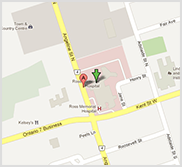Lynx Early Intervention Program
Lynx Early Intervention Program
The Lynx Early Intervention Program identifies people with first episode psychosis as early as possible and provides intensive, sustained case management. Research shows that early detection and treatment of psychosis leads to quicker and more complete recovery.
The Lynx Early Intervention Program is part of the Ross Memorial Hospital’s Mental Health, Community Counselling Services. The Ministry of Health funds this service and there is no fee for this treatment. The Lynx program encompasses Early Psychosis Intervention (EPI) services provided in Campbellford, Cobourg, Peterborough and Haliburton. The case management services are coordinated with Family Support and Education services provided through local Canadian Mental Health Association branches. The EPI case managers and psychiatrists are qualified and experienced clinicians who specialize in working with youth with first episode psychosis.
The Lynx EPI service provides:
- Education about psychosis and its treatment.
- A comprehensive assessment to determine the individual’s unique needs. Regular assessments ensure treatment is progressing well.
- Building a team of people who will help the person achieve a sustained recovery. This team always includes the case manager, psychiatrist, family education and support coordinator, and may also include family members, family doctor, educators or anyone concerned with the person’s recovery.
- Practical assistance with day-to-day living such as help establishing a routine or developing a plan to return to work or school.
- A range of psychosocial treatments including stress management, relapse prevention and treatment of other mental health issues.
- Emotional support.
Who do EPI serve?
- People aged 14-35 in the early stages of psychosis and their families.
- Residents of the City of Kawartha Lakes.
Referrals
Self-referrals and referrals from physicians, educators, or other helping professionals are welcome. Referrals can be made by calling 705-328-6064 or 324-6111 ext 8227.
What is Psychosis?
- A physical condition of the brain that affects all aspects of a person’s life.
- Early warning signs are suspiciousness, thoughts that are faster or slower than normal and a vague sense that things are different. These changes often lead to a decline in functioning.
- Symptoms include hallucinations, delusions and disorganized thinking. These have been called “positive” or active symptoms. “Negative” or passive symptoms include such changes as a lack of spontaneity, social withdrawal and slowed movements.
- Psychosis affects about 3% of the population. It occurs equally in males and females and tends to emerge during adolescence and early adulthood.
- Families play an important role in treatment. Research shows that when families are involved in care and treatment, the person with psychosis can make a better recovery.
- With prompt attention and treatment most people will recover.
@RossMemorialHospital
Follow us and stay up to date on news, events and health related issues:


